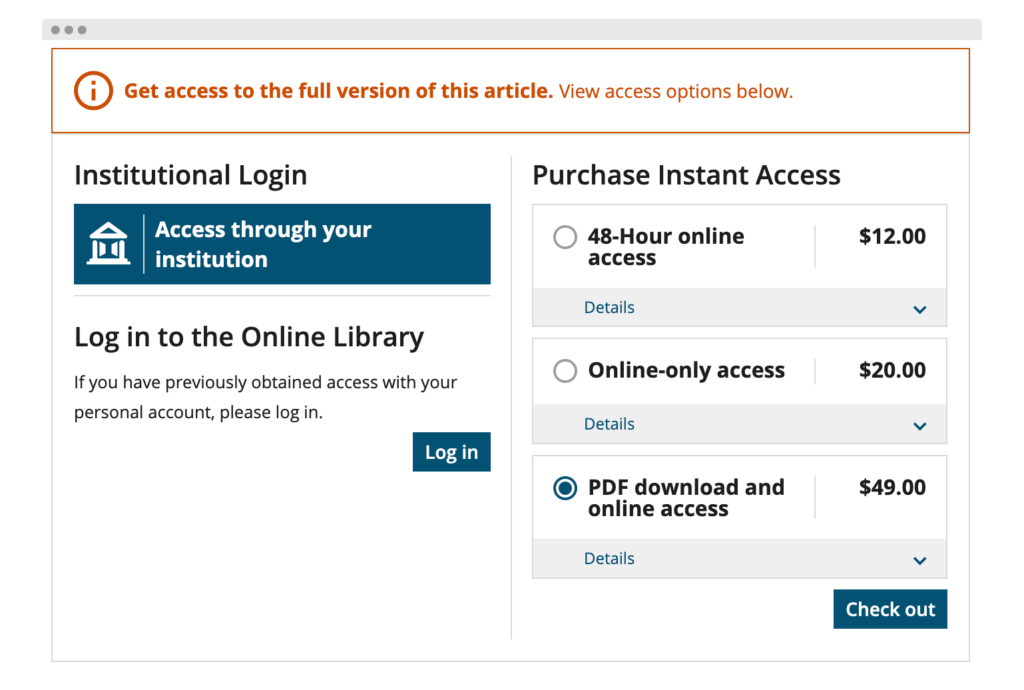About Paywalls

A paywall is a method of restricting access to content, with a purchase or a paid subscription, especially news.[1][2] Beginning in the mid-2010s, newspapers started implementing paywalls on their websites as a way to increase revenue after years of decline in paid print readership and advertising revenue, partly due to the use of ad blockers.[3] In academics, research papers are often subject to a paywall and are available via academic libraries that subscribe.[4][5][6]
There are different types of paywalls, including:
-
Hard Paywall: Users must pay before they can access any content on the website. They typically have no access to articles or other content unless they subscribe or make a payment.
-
Soft Paywall: Some content is accessible for free, but access to premium or exclusive content requires a subscription or payment. Publishers may allow users to read a limited number of articles for free each month before requiring payment.
-
Metered Paywall: Users can access a certain number of articles for free within a specific time period (e.g., a month), after which they must subscribe or pay to access additional content.
-
Freemium Model: Publishers offer a combination of free and premium content. Basic content is available for free, while exclusive or premium content requires a subscription or payment.
Paywalls are designed to strike a balance between providing some content for free to attract users while also generating revenue from those willing to pay for access to premium content. They can be effective in monetizing digital content and supporting journalism but may also limit the reach of content and reduce visibility for non-subscribers.
Cited Works
- Tom Felle (4 March 2016). "Are paywalls saving journalism?". City, University of London. Archived from the original on 4 April 2020. Retrieved 3 May 2017.
- ^ Joseph Lichterman (20 July 2016). "Here are 6 reasons why newspapers have dropped their paywalls". NiemanLab. Archived from the original on 21 March 2019. Retrieved 3 May 2017.
- ^ Jump up to:a b c Preston, Peter (7 August 2011). "A Paywall that pays? Only in America". The Guardian. London. Archived from the original on 9 March 2021. Retrieved 22 October 2011.
- ^ McWilliams, James (12 March 2019). "Why Should Taxpayer-Funded Research Be Put Behind a Paywall?". Pacific Standard. Archived from the original on 12 May 2021. Retrieved 27 May 2021.
- ^ Sample, Ian. "Harvard University says it can’t afford journal publishers’ prices. Archived 1 October 2017 at the Wayback Machine" The Guardian 24 (2012): 2012.
- ^ "Skirting Around Paywalls: How Scientists Quickly Get the Articles They Need". 3 March 2014. Archived from the original on 25 May 2021. Retrieved 5 July 2017.
The Library and Access
John B. Cade Library Can Help You Through Paywalls
Many news sources block online content with paywalls, but library has digital subscriptions that can help you access articles. Here is a list of services available at John B. Cade Library to remove barriers for research articles.
Email: library@subr.edu
Instant Messaging/Chat: http://www.subr.edu/library and click on the chatbox located to the right of the page.
Text: 225.475.3176
Phone: 225.771.4991
John B Cade Library Remote Services: https://subr.libguides.com/RemoteServices